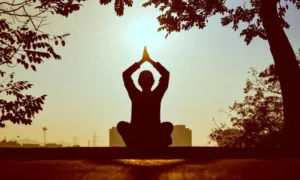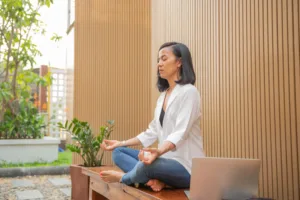How to meditate: 6 effective and practical steps to help you start your meditation practice
Are you feeling overwhelmed by stress and anxiety? Do you find it hard to focus on your daily tasks? You may need to learn how to meditate. Starting a meditation practice may be just what you need to find balance and peace in your life. Focus, stress and anxiety management are few of the reasons why people meditate.
In this article, we will guide you through the process of starting a meditation practice and show you how it can benefit your mental and physical well-being.
Learning how to meditate can be intimidating, especially if it requires you to sit quietly for a long period. It’s normal to feel agitated or restless during meditation, but don’t let this discourage you. It takes practice to train your mind to focus and quiet your thoughts. If you find yourself getting distracted, gently bring your attention back to your breath. This could take some time to get used to, but remember that you get better at something you do regularly. To get you started, you can also familiarize yourself with the 4 main types of meditation.
Now that we have addressed some of the challenges of starting a meditation practice and the common agitation many people feel when starting a practice, let’s talk about how to start your meditation practice. Follow these simple steps to get started.
Step 1: Find a quiet and comfortable space
The first step is to find a quiet and comfortable space where you won’t be disturbed. This could be a dedicated meditation room or simply a corner of your living room where you won’t be disturbed. The idea is to have a small corner to yourself so that you can maintain your focus. It’s useful to create a dedicated meditation space that feels calming and peaceful. Make sure the space is clean and free from distractions like your phone, TV, or computer.
You can sit on a mat and cushion, and cross your legs however it is comfortable for you. Or, you can sit on a chair with your feet placed firmly on the ground. In both cases, make sure your back is straight and that you are comfortable.
Step 2: Choose a time to meditate

As you start learning how to meditate, choose a time that works for you. Consider your schedule and what time of the day you prefer meditating. Some people prefer to meditate first thing in the morning because it helps them improve their focus and productivity for the day, while others find it helpful to meditate before bed because it helps to wind down from the day and improve sleep quality. Whatever time you choose, make sure you stick to it. Consistency is key when starting a new habit. Consider your schedule and ensure you choose a time that is suitable and something you can commit to consistently.
Step 3: Set a timer
As you begin to learn how to meditate, set a timer for just five minutes, and gradually increase the time as you become more comfortable with the practice. It is a good idea to start with short meditation sessions and gradually increase the time as you get more comfortable. Remember to start small so that you can build up steam and avoid burnout from doing too much too soon. Set a timer on your phone or use a meditation app to keep track of the time.
Step 4: Focus on your breath
Now it’s time to begin your meditation practice. Close your eyes, take a deep breath in through your nose, and exhale through your mouth. Focus on the sensation of your breath as it enters and leaves your body. Your mind will likely wander and you may have moments of distraction. This is normal. If or when that happens, gently bring your attention back to your breath.
Step 5: Be patient
Learning how to meditate takes time. Remember that meditation is a practice and it takes time to see results. Be patient with yourself and don’t give up if you don’t notice immediate changes. It’s essential to make meditation a part of your daily routine to see the benefits. Like any new habit, starting a meditation practice takes time and consistency. Aim to practice meditation every day, even if it’s just for a few minutes. You’ll start to see the benefits of regular meditation over time, including reduced stress, improved focus, and increased happiness.
Step 6: Find a Community

While you can practice on your own, it is a good idea to find a community. Meditating with others can be a powerful way to deepen your practice and find support. Look for local meditation groups, classes, or workshops in your area. You can also find online communities or meditation apps that connect you with other meditators.
Conclusion
According to a Chinese proverb, the journey of a thousand miles starts with one step. Your decision to start a meditation practice is the first step to helping you achieve better physical and mental health. Starting a meditation practice is a simple and effective way to find some peace and calm in the midst of the chaos of life. And starting a meditation practice is the action required to learn how to meditate. As you already know, meditation is an excellent way to reduce stress and anxiety, increase your focus and concentration, and boost your overall well-being.
Now that you have a basic understanding of how to start a meditation practice, it’s time to take action. Set aside time each day to practice meditation and be patient with yourself as you develop this new habit. Follow these simple steps to get started and remember to be patient with yourself. The more you practice, the easier it will become, and the greater the benefits you will experience.
Let us help you take the next step now!
Would you like to take the next step of starting your new meditation habit together? Sign up for our free live-guided wellness sessions!
Enjoyed this article? Share it!
Keep reading!

Ways to Deal With Discomfort and Pain
Many of us are going through the challenge of pain or discomfort on a daily basis. Depending on the severity, this can stop people from

5 Best Types of Music for Meditation
1. Ambient Music What It Is: Ambient music is a genre characterized by its atmospheric, immersive quality. It often features subtle melodies, slow tempos, and

How Meditation Can Enhance Emotional Connection in Relationships
In recent years, meditation has gained widespread attention for its profound impact on personal well-being. But did you know it can also play an important

Embracing Stillness: 4 Simple Meditation Techniques for Overcoming Cravings
Cravings can be relentless, whether you’re dealing with the urge to eat unhealthy foods, the pull of an addictive substance, or even the compulsion to

Sleep Better, Live Better: Meditation for Insomnia Relief
Insomnia affects millions of people worldwide, leading to various health issues such as fatigue, irritability, and a weakened immune system. One effective method to combat

Clarity Amidst Chaos: How to Use Meditation for Concentration and Focus
Let’s talk about why meditation for concentration and focus is important. Focus is a crucial aspect of daily life that allows individuals to concentrate their

